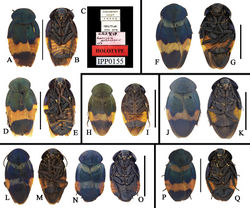Eucorydia pilosa
| Notice: | This page is derived from the original publication listed below, whose author(s) should always be credited. Further contributors may edit and improve the content of this page and, consequently, need to be credited as well (see page history). Any assessment of factual correctness requires a careful review of the original article as well as of subsequent contributions.
If you are uncertain whether your planned contribution is correct or not, we suggest that you use the associated discussion page instead of editing the page directly. This page should be cited as follows (rationale):
Citation formats to copy and paste
BibTeX: @article{Qiu2017ZooKeys, RIS/ Endnote: TY - JOUR Wikipedia/ Citizendium: <ref name="Qiu2017ZooKeys">{{Citation See also the citation download page at the journal. |
Ordo: Blattodea
Familia: Corydiidae
Genus: Eucorydia
Name
Eucorydia pilosa Qiu & Che & Wang, 2017 sp. n. – Wikispecies link – ZooBank link – Pensoft Profile
- Eucorydia dasytoides: Woo et al. 1986[1]: 154 (non E. dasytoides, misidentification).
Type material
HOLOTYPE: CHINA: Yunnan: male (SWU), Xiaoheijiang Forest Park [小黑江森林公园], Simao District [思茅区], Pu’er City [普洱市], 25.VII.2009, Zong-Qing Wang leg. PARATYPES: CHINA: Yunnan: 1 male (SWU), around Jiujin Township [酒井乡] and Huimin Township [惠民乡], Lancang County [澜沧县], Pu’er City [普洱市], 1135m, 10.VI.1980, no collector recorded; 1 male (SWU), Mengzhe Town [勐遮镇], Menghai County [勐海县], Xishuangbanna Prefecture [西双版纳州], 870m, 1.VI.1958, Zhi-Zi Chen leg.; 1 male (SWU), Mengzhe Town, Menghai County, Xishuangbanna Prefecture, 875m, 4.VII.1958, Fu-Ji Pu leg.
Other material examined
CHINA: Yunnan: 1 male (SWU), abdomen missing, around Jiujin Township and Huimin Township, Lancang County, Pu’er City, 1135m, 10.VI.1980, no collector recorded.
Diagnosis
This species resembles the tonkinensis population of E. dasytoides, but differs from the latter by: 1) having whitish pubescence at the base of tegmina, 2) the cerci of male is shorter; 3) median of supra-anal plate widely “V” shaped (Fig. 8C, No.1-2) (the concave part narrow, more round laterally in the supra-anal plate of tonkinensis population of E. dasytoides); 4) R2 elongate and rhomboid (Fig. 8C, No. 6) (nearly round in the tonkinensis population of E. dasytoides (Fig. 6F, G–O, No. 2).
Description
Male: measurements (mm): body length 13.8–15.1, overall length 18.9–21.5, pronotum length×width 4.5–4.8×6.8–7.4, tegmen length 14.1–15.9. Median size, metallic purplish blue (Fig. 7F–G).
Head shiny, metallic blackish blue; antennae (except the whitish segments), maxillary palpi and labial palpi black. Pronotum metallic blue, with black long setae. Tegmina with basal half metallic blue, the basal half of anal areas with white pubescence, distal half with a yellow band transversely across the tegmina which occupies nearly 1/6 of the tegmen length, the basal edge of the band metallic purple, the apical portion of tegmina blackish, slightly metallic purple. Wing brown, venation brown, distinct, median of the outer margin with elongate yellow spots, a yellow trail originates from each spot and extends to the median of the wing. Legs black, slightly pubescent, spines on the legs black, with apex reddish brown.
Abdomen in ventral view, margins pubescent, the last two and the lateral portions of 6th to 7th sternites black, slightly metallic, the rest orange. Supra-anal plate with hind median broadly concave, cerci short (Fig. 8C, No. 1-2); subgenital plate with two long and robust styli.
Genitalia (Fig. 8C): L3 with the apex hook gently curved; the appendage sclerite with basal left roundly protruding, hind portion elongate, gradually narrower; R2 elongate, slightly rhomboid shaped, details as in Fig. 8C, No. 6.
Female unknown.
Etymology
The species epithet “pilosa” refers to its whitish pubescence on tegmina base.
Remarks
This species and E. dasytoides were confused and misidentified in Woo et al. (1986)[1]. They treated this species as E. dasytoides, and an E. dasytoides individual from Yunnan as a new species E. paucipilosa Woo, Guo & Feng.
Natural history
The holotype was found inside a mixture of humus by the second author.
Distribution
China: Yunnan.
Original Description
- Qiu, L; Che, Y; Wang, Z; 2017: Revision of Eucorydia Hebard, 1929 from China, with notes on the genus and species worldwide (Blattodea, Corydioidea, Corydiidae) ZooKeys, (709): 17-56. doi
Images
|


